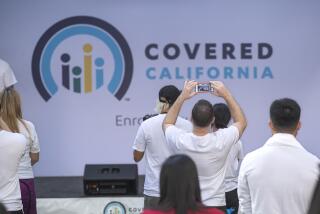State healthcare exchange reports sharp increase in enrollment
California’s health insurance exchange reported sharply higher enrollment ahead of Monday’s sign-up deadline for Jan. 1 coverage, amid mounting criticism over how it handles consumer privacy.
The Covered California exchange said Thursday that 53,510 people enrolled in health plans over a three-day period this week, culminating with more than 20,000 people picking an insurance company on Wednesday alone. Last week, about 15,000 people were enrolling daily.
“December has turned out to be an enormous month for Covered California,” said Peter Lee, executive director of the state exchange. “Twenty thousand people in one day is a lot.”
By contrast, the exchange got about 31,000 enrollees during the entire month of October.
Exchange officials said they are gearing up in preparation for an even bigger turnout leading up to Monday, the final day to apply for coverage starting Jan. 1. Open enrollment continues through March 31.
The exchange said it has borrowed staff from other state agencies and extended its service center hours. Lee acknowledged that many consumers have grown frustrated at long wait times on the phone and with a lack of clarity about the status of their insurance application so close to Jan. 1.
The state reported an average wait time of 31 minutes last week, and many consumers say they can’t get through at all.
Lee vowed that the exchange won’t let any consumers fall through the cracks — if they meet the Monday deadline. “If a consumer has started an application and through no fault of their own can’t get through the process, we will get them through” for coverage starting Jan. 1, he said.
With the deadline approaching, Lee encouraged people to enroll online or to work with an enrollment counselor or certified agent rather than fill out a paper application that will take longer to process.
The state’s most recent numbers are not reflected in the latest statewide totals that go through Dec. 7. As of then, more than 156,000 people had enrolled in health plans, and nearly 180,000 people had qualified for Medi-Cal, the state’s Medicaid program.
Thursday, the exchange said a paper application in Spanish won’t be available until early next month. Supporters of the healthcare law have criticized Covered California for low enrollment among Latinos so far, and they have cited the lack of a Spanish-language application as one impediment.
Meantime, the exchange took fresh criticism Thursday from a state lawmaker over its decision to hand over consumers’ contact information to outside insurance agents without consent earlier this month.
To boost enrollment, the exchange has given its 9,000 certified agents access to names and contact information for tens of thousands of people who started an online application but never finished. The exchange didn’t share Social Security numbers, income or other personal information.
Assemblyman Jeff Gorell (R-Camarillo) said he will introduce legislation early next month that would bar Covered California from sharing applicants’ information unless consumers give consent. Gorell said he has received numerous calls from constituents who are concerned about the practice.
“This exemplifies a cavalier attitude some government bureaucrats take toward our personal information,” he said. “I don’t see the problem with requiring notification and letting people know who might end up with their information.”
Covered California has defended the program as another way to help people enroll and to draw on experienced agents who are ready to pitch in. Lee has acknowledged that the exchange may need to add more disclosure about the practice on its website.
“One thing we need to communicate better is the exchange includes licensed agents we have contracts with,” Lee said last week.
Asked about the proposed legislation, an exchange spokeswoman said the agency is “committed to protecting all consumers’ information.”
Some legal experts said Covered California could have avoided the problem by emailing applicants directly and recommending local agents they could contact.
“I think the exchange was so focused on making one goal, enrollment, that they forgot about another key goal: privacy,” said Seth Chandler, a law professor and insurance expert at the University of Houston. “I think it was just plain stupid.”
Twitter: @chadterhune
More to Read
Inside the business of entertainment
The Wide Shot brings you news, analysis and insights on everything from streaming wars to production — and what it all means for the future.
You may occasionally receive promotional content from the Los Angeles Times.











